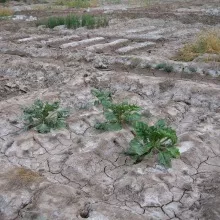Soil Salinity and Soil Fertility Management in Africa
In the Sub-Saharan Africa (SSA), two-thirds of the region’s people depend on agriculture for their livelihoods. The major threats to small-scale agriculture are increasing water scarcity and degradation due to soil nutrient depletion and soil salinization. In addition, climate change impacts are also threatening the achievement of Millennium Development Goals aimed at poverty and hunger reduction, health improvement and environmental sustainability. Farmers in dry regions face a number of natural resource and soil-related challenges which hamper their farm productivity. These include lack of soil fertility information and adoption of land management practices. In rainfed agriculture, water erosion has degraded the soils and depleted the nutrients leading to increased cost of agriculture production whereas irrigated agriculture has increased secondary salinization. It is therefore imperative to enhance the restoration of degraded agricultural lands to promote sustainable agriculture. The food security gap in African countries can be reduced if land degradation issues are dealt with holistically to conserve soil resources and keep them healthy and fertile.
This training is designed to address land degradation issues in Africa and to present various options to either reverse or reduce them to intensify agriculture. The participants of this training will be oriented to the importance of healthy soils for ecosystem services and identification of diagnostics-based constraints to farm soil health. The training will improve participants’ knowledge about the best management practices at farm level to combat soil desertification and soil degradation. The participants will also get information about conservation agriculture, integrated soil fertility management and integrated soil reclamation. The participants will learn through tailored contents bringing science from laboratory to fields and vice versa. In addition, the training will provide an opportunity to exchange ideas on a range of topics and network with other participants.
Organizers
International Center for Biosaline Agriculture (ICBA)
Funder: Islamic Development Bank (IDB)
Partner countries: Senegal, Nigeria, Niger, Mauritania, Cameroon, Benin, Gambia, Burkina Faso, Mali, Ethiopia and Sudan.
Event Coordinator











